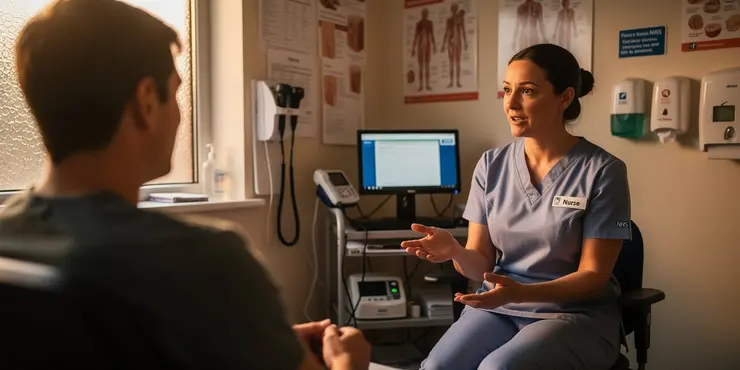
Find Help
More Items From Ergsy search
-
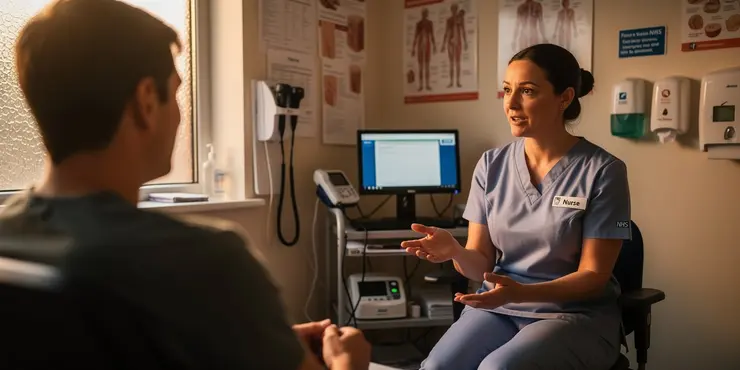
What is sunburn?
Relevance: 100%
-
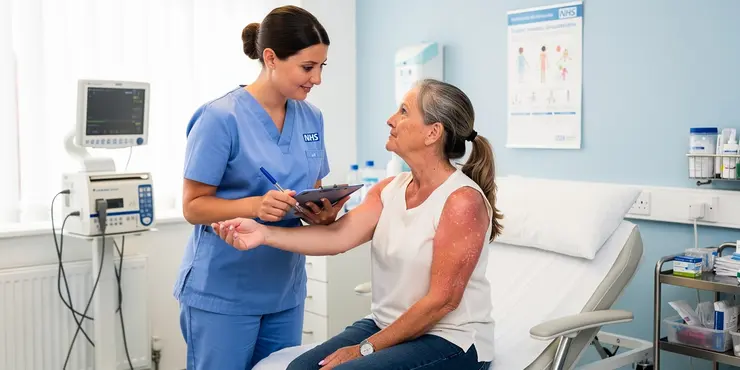
What is Sunburn?
Relevance: 100%
-
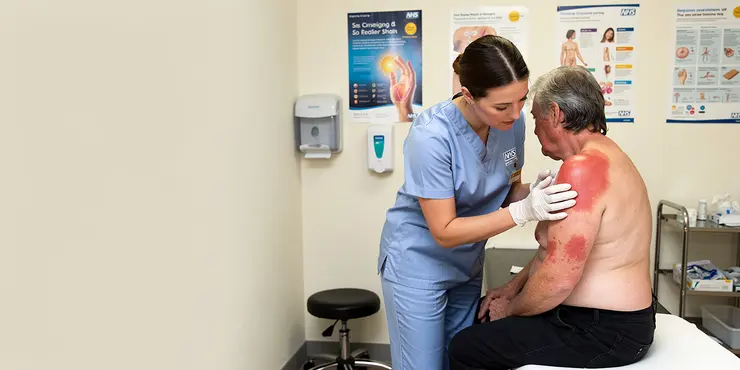
What are the symptoms of sunburn?
Relevance: 95%
-
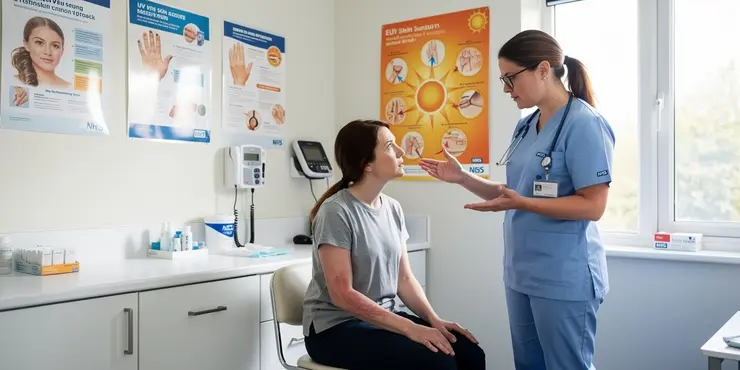
What causes sunburn?
Relevance: 95%
-
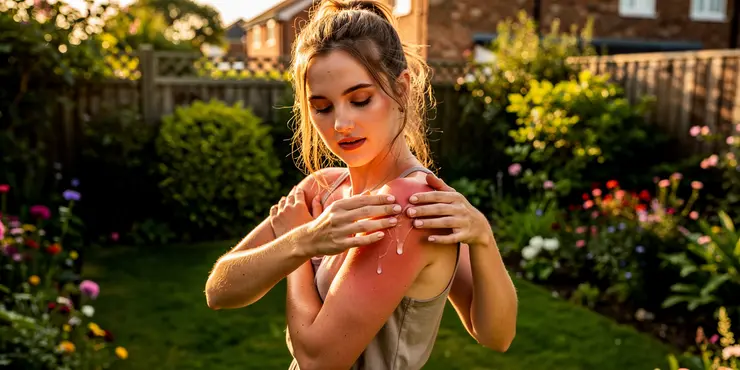
Self care - sunburn
Relevance: 95%
-
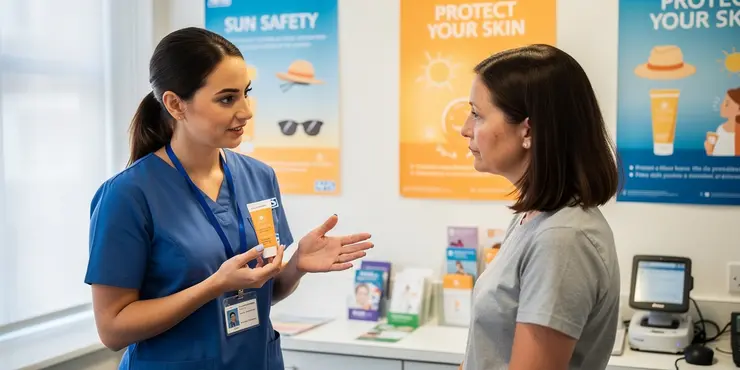
Can sunburn be prevented?
Relevance: 94%
-
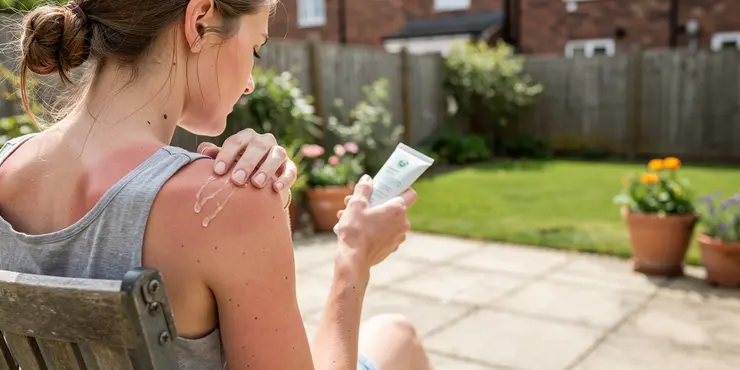
Self care - sunburn
Relevance: 94%
-
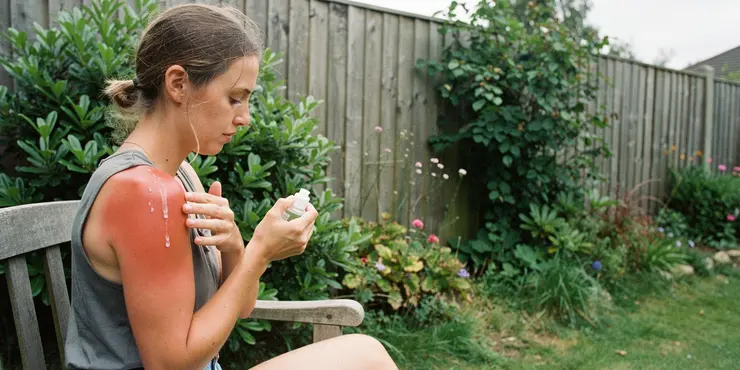
How is sunburn treated?
Relevance: 94%
-
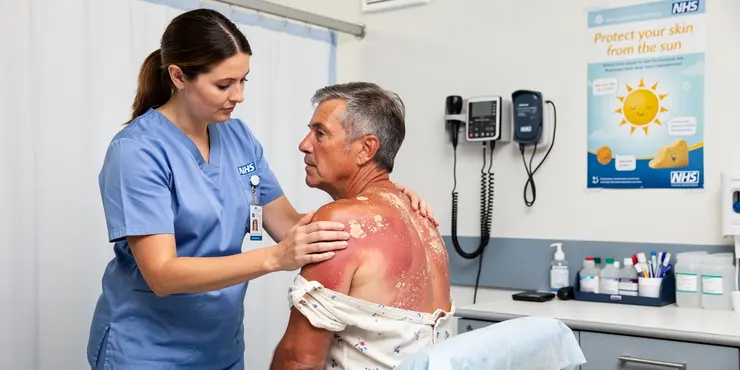
Can sunburn turn into a tan?
Relevance: 92%
-
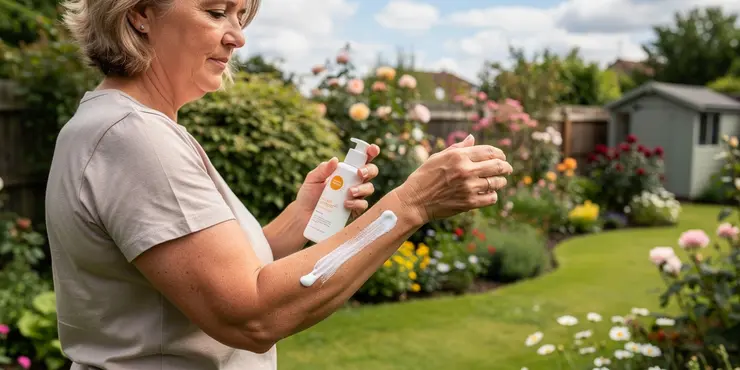
What are the long-term effects of sunburn?
Relevance: 90%
-
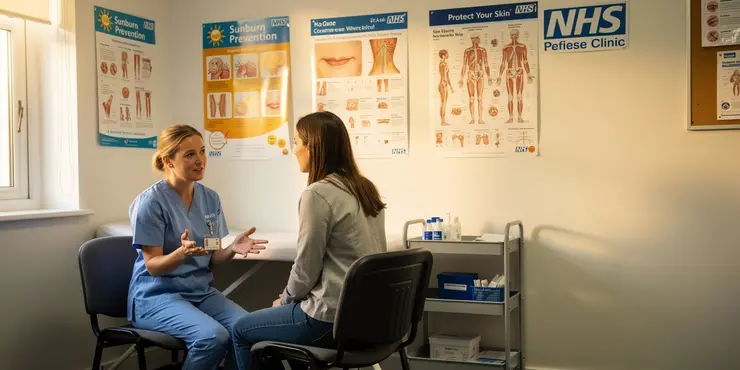
Are some people more prone to sunburn?
Relevance: 89%
-
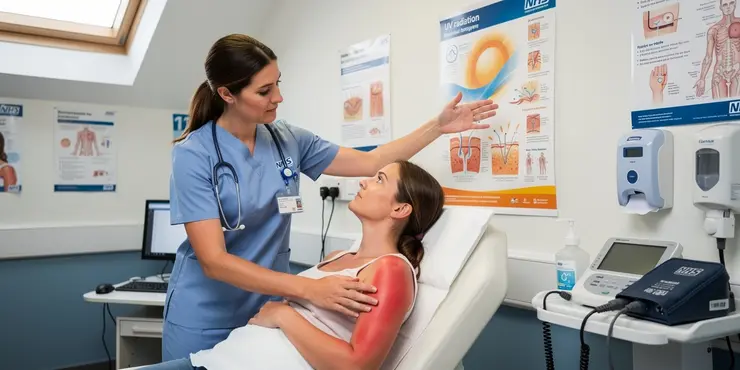
Can sunburns cause permanent damage?
Relevance: 87%
-
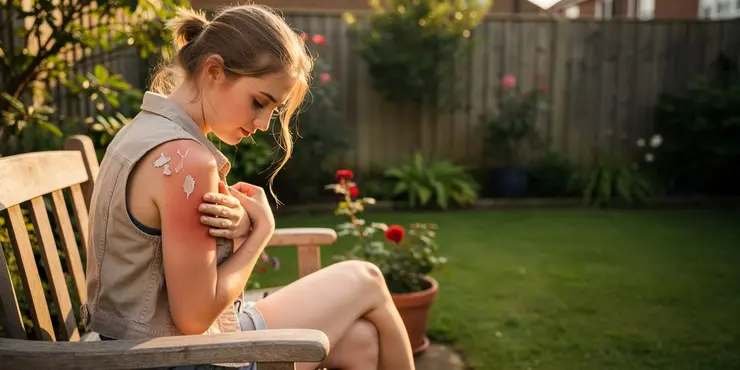
Is peeling a normal part of sunburn recovery?
Relevance: 86%
-
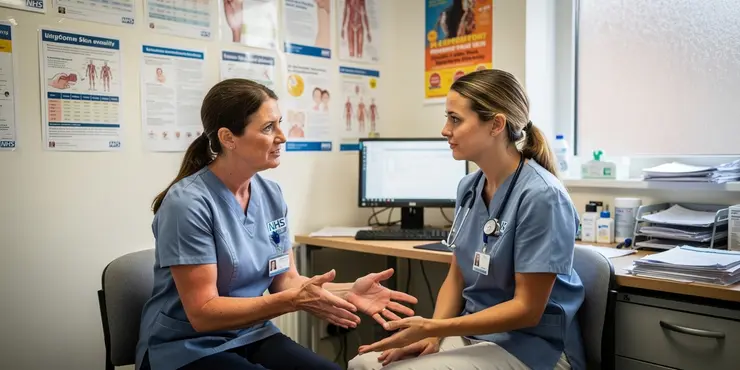
How long does it take for sunburn to appear?
Relevance: 86%
-
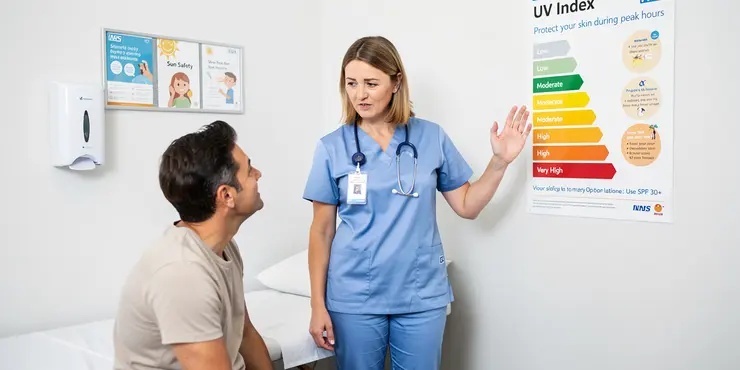
At what time of day is the sunburn risk highest?
Relevance: 85%
-
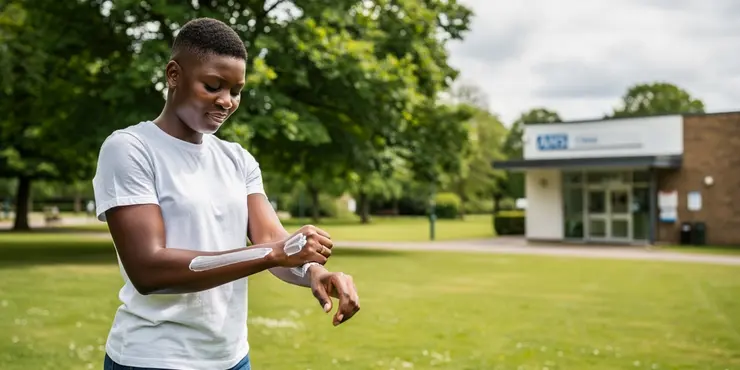
Can dark-skinned individuals get sunburned?
Relevance: 84%
-
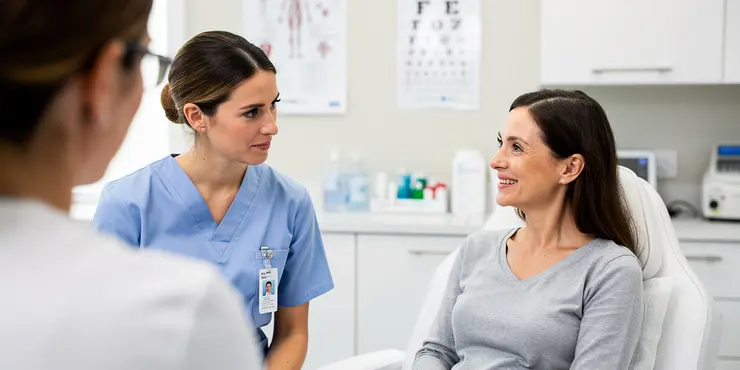
Does tanning lotion prevent sunburn?
Relevance: 83%
-
Does tanning on sunbeds reduce the risk of future sunburns?
Relevance: 78%
-

What SPF level is recommended to prevent sunburn?
Relevance: 75%
-
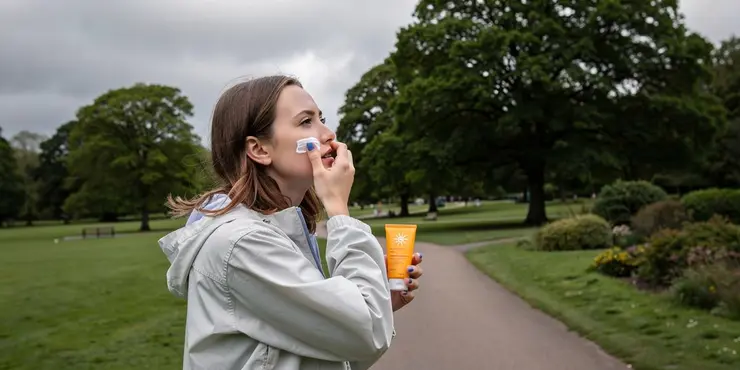
Is it possible to get sunburned on cloudy days?
Relevance: 63%
-
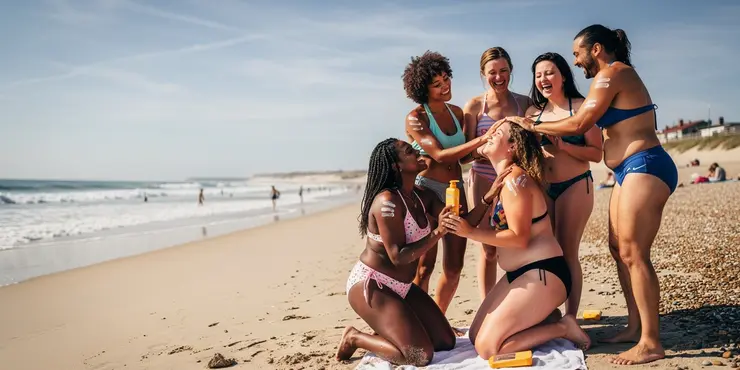
Does water reflect UV rays, increasing the risk of sunburn?
Relevance: 54%
-
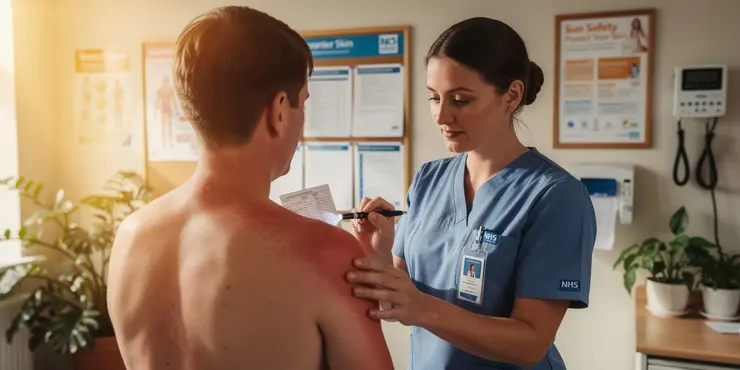
What to do if you're sunburnt
Relevance: 47%
-
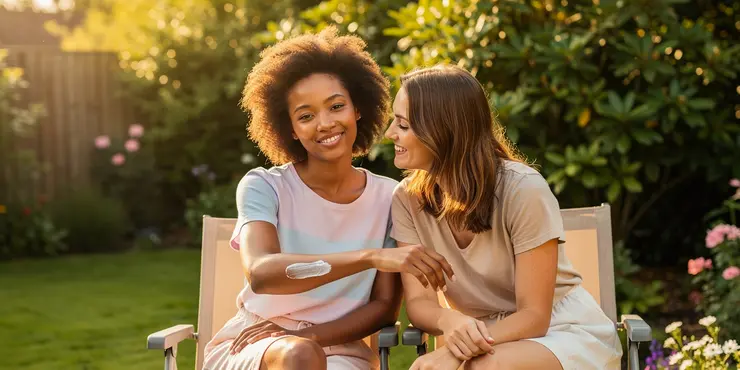
Why do some people not burn as easily as others?
Relevance: 42%
-
Is pre-tanning in a sunbed a good way to prepare my skin for sun exposure?
Relevance: 29%
-
Do sunbeds provide a safer way to tan compared to natural sunlight?
Relevance: 29%
-
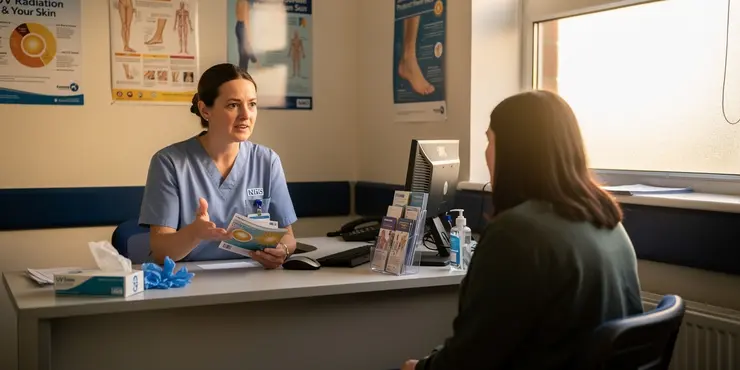
What is UV radiation?
Relevance: 28%
-
Is it safe to sunbathe a baby with jaundice?
Relevance: 27%
-
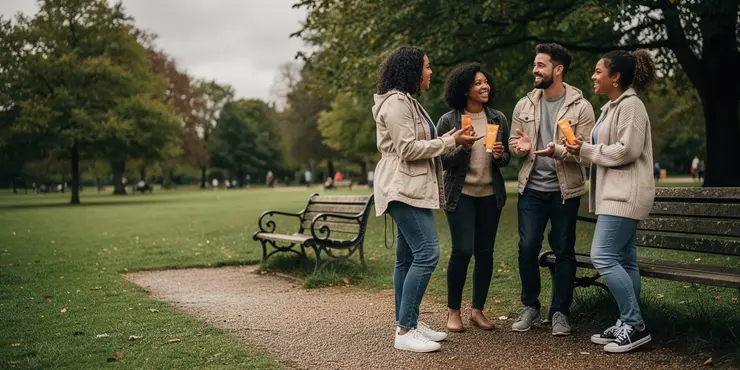
Do I need sunscreen on cloudy days?
Relevance: 24%
-

What does SPF stand for?
Relevance: 22%
-
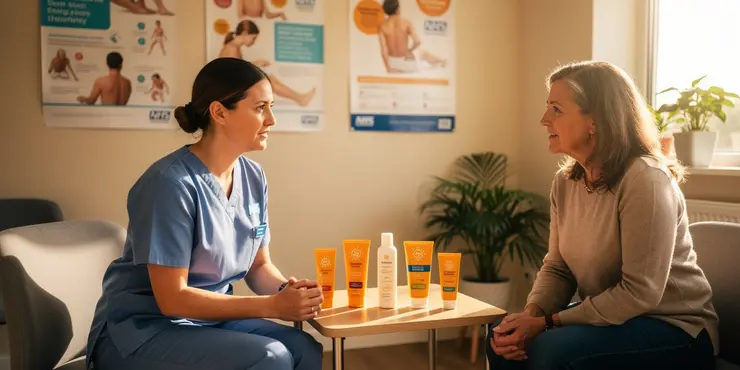
Which factor sunscreen should I use?
Relevance: 22%
-
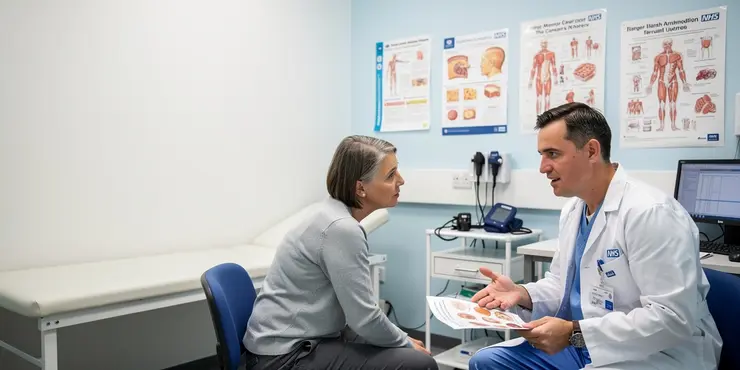
Skin cancer education
Relevance: 21%
-

What should I wear to stay cool in hot weather?
Relevance: 21%
-
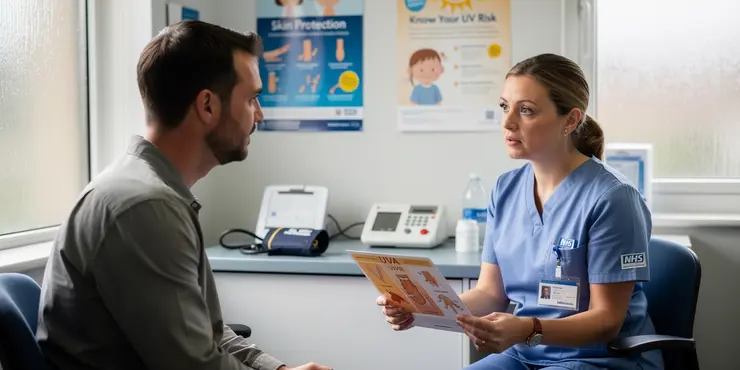
What are UVA and UVB rays?
Relevance: 21%
-
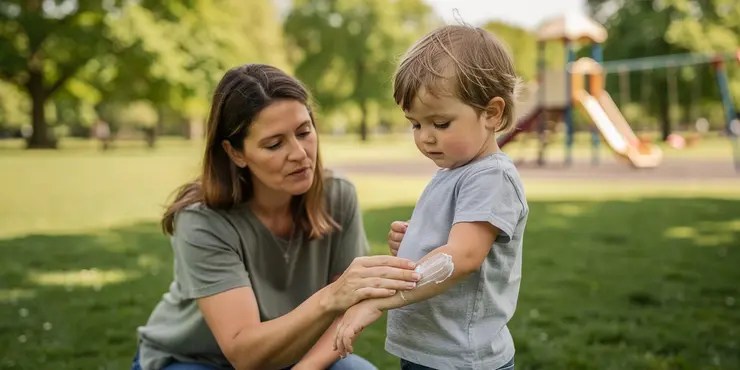
What SPF is best for children?
Relevance: 20%
-
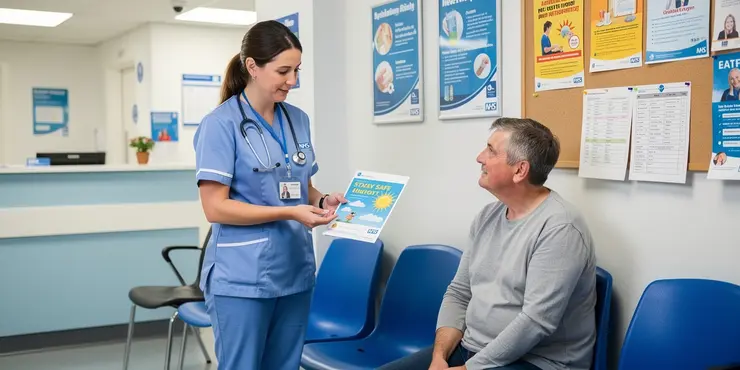
How can I prevent heat-related illnesses?
Relevance: 19%
-
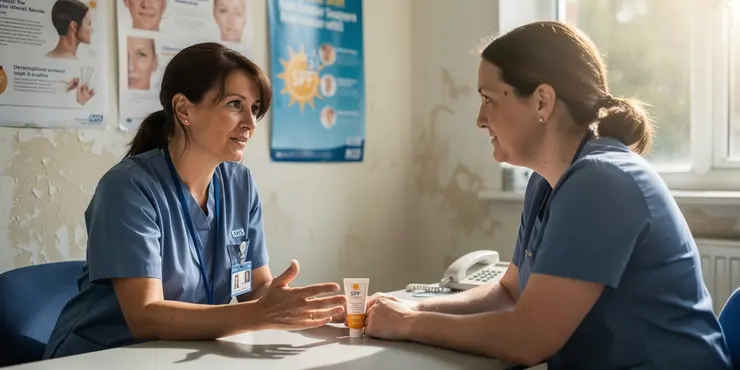
What SPF should I use if I am going to be outdoors all day?
Relevance: 18%
-
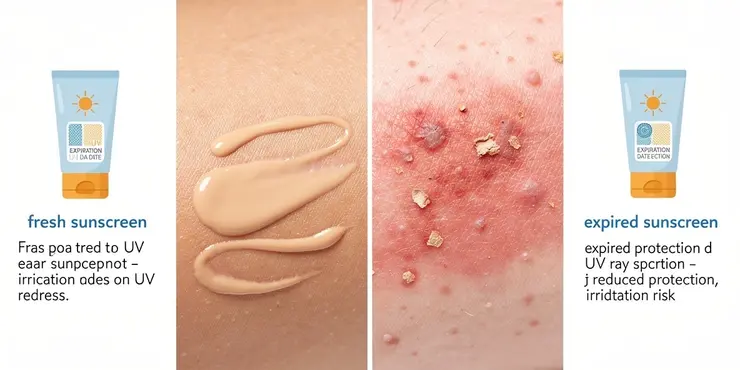
Can I use expired sunscreen?
Relevance: 18%
-
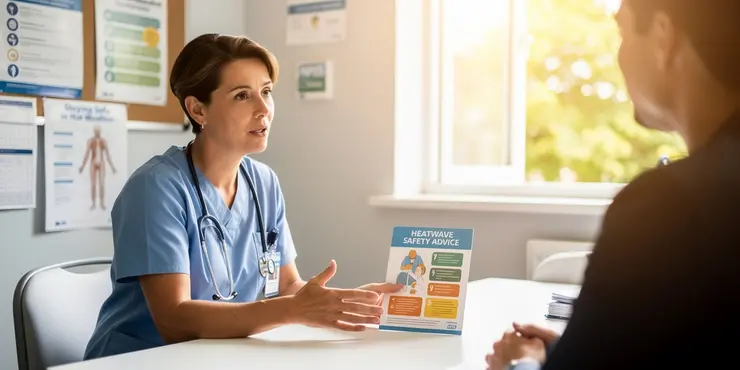
What activities should I avoid during a heatwave?
Relevance: 18%
-
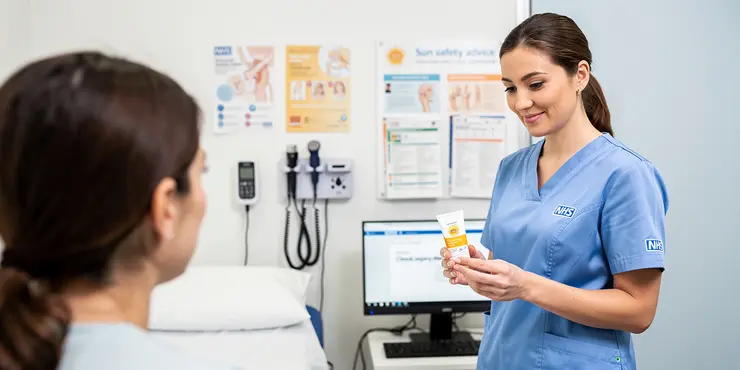
Does sunscreen expire?
Relevance: 18%
-
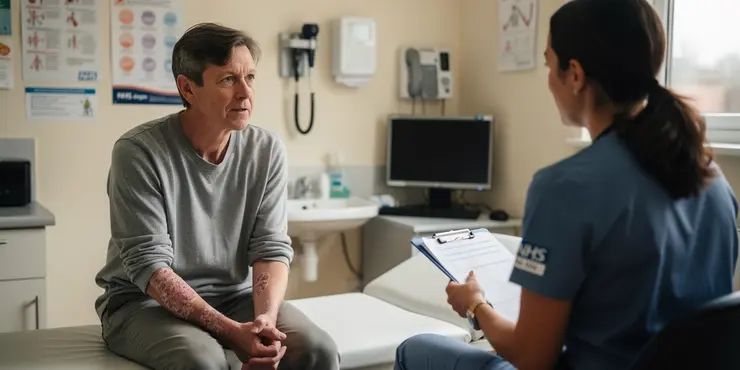
What causes psoriasis?
Relevance: 18%
What is Sunburn?
Sunburn is an inflammatory reaction of the skin that occurs after excessive exposure to ultraviolet (UV) radiation, most commonly from the sun. It manifests as red, painful skin that is hot to the touch and, in more severe cases, can lead to blistering and peeling. Recognizing the causes, symptoms, and consequences of sunburn is essential for preventing this common, yet often overlooked, risk of enjoying outdoor activities.
Causes of Sunburn
Sunburn is caused by overexposure to UV radiation, which damages the DNA in skin cells. There are two main types of UV radiation: UVA and UVB. UVA rays penetrate the skin more deeply, contributing to premature aging and skin damage, while UVB rays are primarily responsible for sunburn. Both types, however, can contribute to the risk of developing skin cancer. While the risk of sunburn varies depending on the time of day, season, and proximity to the equator, it is crucial for individuals to take preventive measures regardless of these factors.
Symptoms of Sunburn
The symptoms of sunburn can range from mild to severe, depending on the intensity and duration of UV exposure. Common symptoms include redness, tenderness, and warmth of the skin. In more extreme cases, sunburn can result in swelling, blistering, and even systemic symptoms such as fever, chills, nausea, and fatigue. Typically, symptoms start appearing a few hours after sun exposure and may worsen over the next couple of days.
Consequences and Risks
Repeated sunburns increase the risk of severe long-term health issues, the most serious of which is skin cancer, including melanoma, basal cell carcinoma, and squamous cell carcinoma. Additionally, chronic sun damage can lead to photoaging, which includes wrinkles, leathery skin, and loss of skin elasticity. Even without immediate visible damage, persistent UV exposure can cumulatively impact skin health over the years.
Prevention and Protection
Preventing sunburn involves a combination of strategies to limit UV exposure. Applying a broad-spectrum sunscreen with an SPF of at least 30 is essential, even on cloudy days, as up to 80% of UV rays can penetrate clouds. Broad-brimmed hats, long-sleeved clothing, and sunglasses can provide additional protection. It is also advisable to seek shade, especially during peak UV hours between 11 am and 3 pm. Reapplying sunscreen every two hours, or more frequently if swimming or sweating, is critical for sustained protection.
Treatment for Sunburn
While it is best to prevent sunburn, several remedies can alleviate discomfort if it occurs. Cool baths, moisturizers containing aloe vera or soy, and drinking plenty of fluids help soothe and hydrate the skin. Over-the-counter anti-inflammatory medications, such as ibuprofen or aspirin, can relieve pain and reduce inflammation. However, severe sunburn with extensive blistering should be evaluated by a healthcare professional to prevent complications such as infection.
What is Sunburn?
Sunburn happens when your skin gets too much sun. It makes your skin red and sore. Sometimes, it can even cause blisters or make your skin peel. It's important to know what causes sunburn and how it feels so you can avoid it when playing or being outside.
Causes of Sunburn
Sunburn is caused by getting too much sunlight. The sun has two types of rays: UVA and UVB. UVA goes deeper into the skin and can make you look older. UVB causes sunburn. Both can make you sick with skin cancer. No matter the weather, always protect your skin from the sun.
Symptoms of Sunburn
Sunburn can feel different, from mild to strong. You might see your skin turn red, feel sore, and warm to touch. If it's bad, you might have swelling, blisters, or feel tired and hot. Signs of sunburn can start a few hours after being in the sun and might get worse over a couple of days.
Consequences and Risks
Getting sunburn often can be bad for your health. It can make you more likely to get skin cancer when you grow up. It can also cause wrinkles and tough skin. Even if you don't see the sun damage right away, it can cause problems over time.
Prevention and Protection
To stop sunburn, you need to protect your skin. Use sunscreen with SPF 30 or more, even when it's cloudy. Wear a hat, long sleeves, and sunglasses. Stay under a tree or umbrella, especially from 11 am to 3 pm. Reapply sunscreen every two hours, and more if you swim or sweat.
Treatment for Sunburn
If you get sunburned, there are ways to feel better. Take cool baths and use lotions with aloe vera. Drink lots of water. Medicines like ibuprofen can help with pain. If you have bad sunburn with blisters, see a doctor to make sure it doesn't get infected.
Frequently Asked Questions
What is sunburn?
Sunburn is a skin condition that occurs when skin is overexposed to the sun's ultraviolet (UV) rays, causing inflammation and damage.
What are the symptoms of sunburn?
Symptoms of sunburn include red, painful skin that may feel hot to the touch, swelling, and sometimes blistering and peeling.
How long does it take for sunburn to appear?
Sunburn can start to appear within a few hours of sun exposure, but it may take up to 24 hours to become fully apparent.
How can I treat sunburn?
Treat sunburn by cooling the skin with cold compresses, applying aloe vera or moisturizing creams, and taking pain relievers if needed.
Can sunburn cause long-term damage?
Yes, repeated sunburns can increase the risk of skin cancer, cause premature skin aging, and lead to other skin damage.
How can I prevent sunburn?
Prevent sunburn by using sunscreen with a high SPF, wearing protective clothing, seeking shade, and avoiding the sun during peak hours.
What SPF level should my sunscreen be to protect against sunburn?
Use a broad-spectrum sunscreen with an SPF of at least 30 to protect against sunburn.
Can sunburn occur on cloudy days?
Yes, UV rays can penetrate clouds, so it is possible to get sunburned on cloudy days.
Is there a difference between UVA and UVB rays?
Yes, UVA rays penetrate the skin more deeply and contribute to aging, while UVB rays are primarily responsible for causing sunburn.
What should I do if I have severe sunburn?
If you have severe sunburn with blistering or systemic symptoms, such as fever or nausea, seek medical attention.
Can I get sunburned indoors?
UV rays can pass through windows, so it is possible to get sunburned indoors if you are near a window with direct sunlight.
Does skin type affect the likelihood of getting sunburned?
Yes, people with lighter skin are more susceptible to sunburn than those with darker skin, but anyone can get sunburned.
Can sunburn be reversed?
While the immediate effects of a sunburn can be treated, some skin damage may be irreversible and increase the risk of long-term issues.
Are there any home remedies for sunburn relief?
Yes, cool baths, applying aloe vera gel, and using over-the-counter pain relief can offer sunburn relief.
Is it possible to build up a tolerance to sunburn?
While tanning may offer some protection, there is no safe way to increase tolerance to UV damage.
Does altitude affect the risk of sunburn?
Yes, the risk of sunburn increases at higher altitudes due to increased UV exposure.
How does water influence sun exposure risk?
Water reflects and amplifies UV rays, increasing the risk of burns when swimming or boating.
Why does sunburn make the skin peel?
Peeling is the body's way of getting rid of damaged skin cells after a sunburn.
What role does melanin play in sunburn?
Melanin is the pigment that gives skin its color and provides some protection against UV rays, but it is not foolproof.
Is sunburn contagious?
No, sunburn is not contagious; it is a reaction of the skin to UV exposure.
What is sunburn?
Sunburn happens when your skin gets too much sun. It can make your skin red, sore, and hot. To feel better, you can use cool water or special creams.
Here are some tips to help you:
- Wear a hat and clothes to cover your skin when you are outside.
- Put on sunscreen to protect your skin from the sun.
- Stay in the shade when the sun is very strong.
Sunburn happens when you stay in the sun too long. The sun's rays, called UV rays, hurt your skin and make it red and painful.
What happens when you get sunburn?
Sunburn can make your skin red and sore. These are some signs:
- Your skin turns pink or red.
- Your skin feels warm or hot to touch.
- Your skin can hurt or feel tight.
- You might see blisters on your skin.
- Your skin might peel after a few days.
Tips to help:
- Use sunscreen when you go outside.
- Wear a hat and stay in the shade.
- Avoid the sun when it is very strong.
If you get sunburn, your skin can turn red and hurt. It might feel hot when you touch it. Sometimes, the skin can get swollen, and you might see small bubbles, called blisters. Later, the skin might peel off.
When do you see a sunburn?
Sunburns can show up fast. It might take just a few hours after being in the sun. Sometimes, it can take a whole day to see the redness.
If you get sunburned, try these tips:
- Stay out of the sun.
- Use cool water on your skin.
- Put on lotion to help your skin feel better.
- Drink lots of water to stay hydrated.
Sunburn can show up a few hours after you are in the sun. But sometimes it takes up to 24 hours to really see it.
How can I help a sunburn?
If your skin gets too much sun, it can turn red and hurt. This is called a sunburn.
Here are some easy ways to help a sunburn feel better:
- Stay out of the sun until you feel better.
- Put cool, wet cloths on your skin to ease the pain.
- Take a cool bath to make your skin feel good.
- Use cream or gel like aloe vera to cool the skin.
- Drink lots of water so your body stays healthy.
- If it really hurts, ask a grown-up for medicine to help with the pain.
Remember, next time you go out in the sun, use sunscreen and wear a hat to protect your skin.
If you have sunburn, here's how you can feel better:
1. Use a cold, wet cloth on your skin to help cool it down.
2. Put some aloe vera or skin cream to make your skin feel nice.
3. If it still hurts, you can take medicine to help with the pain.
Can a sunburn hurt you for a long time?
Getting a sunburn can hurt your skin. If it happens a lot, it can be bad for a long time. It's important to protect your skin from the sun.
Some ways to keep your skin safe are:
- Wear sunscreen with a high SPF.
- Put on a hat and wear sunglasses.
- Stay in the shade when the sun is very hot.
- Wear clothes that cover your skin.
If you're worried about sunburn, you can talk to a doctor.
Getting sunburned many times can make it more likely to get skin cancer. It can also make your skin look older faster and cause other skin problems.
How can I stop sunburn?
Stop sunburn by using sun cream with a high number, wearing clothes that cover your skin, staying in the shade, and not going out in the sun when it's really hot.
What number should my sunscreen be to stop sunburn?
Use sunscreen with a high number to protect your skin. Choose SPF 30 or higher.
Tips to help:
- Reapply sunscreen every 2 hours.
- Wear a hat and sunglasses for extra protection.
- Stay in the shade when the sun is very strong.
Use sunscreen with an SPF of 30 or more to keep your skin safe from the sun.
Can you get sunburn on cloudy days?
Yes, you can still get sunburn when it's cloudy. Clouds don't stop all the sun's rays. It's important to wear sunscreen even on cloudy days.
- Use sunscreen to protect your skin.
- Wear a hat to shade your face.
- Stay in the shade when you can.
Yes, the sun's UV rays can go through clouds. This means you can still get a sunburn even when it's cloudy.
Are UVA and UVB rays different?
Yes, UVA rays go deep into the skin and make it age faster. UVB rays mainly cause sunburn.
What to do if you have bad sunburn
If you have a really bad sunburn, here are some easy steps to follow:
- Go inside or find shade to get out of the sun.
- Put on cool, damp cloths or take a cool bath to help your skin feel better.
- Drink a lot of water to help your body stay healthy.
- Use lotion to stop your skin from drying out.
- If it really hurts, tell an adult or see a doctor.
It's important to be careful with your skin when you are outside. Protect yourself by using sunscreen, wearing a hat, and sunglasses. If you need help, ask a friend or family member for support.
If you have very bad sunburn with blisters, or if you feel sick or have a fever, go see a doctor.
Can I get sunburned inside?
Sunshine can come through windows. This means you can get sunburned inside if you sit by a sunny window.
Can your skin type change how easily you get sunburned?
People have different types of skin. Some skin types get sunburned easily. Other skin types do not get sunburned as easily.
If you have light skin, you might get sunburned faster than someone with dark skin. But everyone can get sunburned if they stay in the sun too long.
To help protect your skin, you can use sunscreen. Wear a hat and sunglasses too. These things help keep your skin safe from the sun.
People with lighter skin get sunburned more easily. But anyone can get a sunburn.
Can sunburn go away?
Sunburn can be treated right away, but some harm to your skin might stay forever. This can make more problems happen later on.
Can I use things at home to help with sunburn?
Yes, taking cool baths, putting aloe vera gel on your skin, and using medicine from the store can help make a sunburn feel better.
Can your skin get used to the sun?
When you spend a lot of time in the sun, you might wonder if your skin can become stronger against sunburns.
Here are some ways to protect your skin:
- Wear sunscreen. Put it on your skin before you go outside.
- Wear a hat and sunglasses. They help keep the sun away from your face.
- Stay in the shade when the sun is very bright.
Remember, it is important to be careful and take care of your skin.
Tanning might help a little bit, but it's not a safe way to protect your skin from the sun's harmful rays.
Does being high up in the mountains make it easier to get sunburned?
Yes, you can get a sunburn more easily in the mountains. This is because there is more UV light from the sun.
How does water affect being in the sun?
Water can change how the sun affects you.
- Water can make the sun's rays stronger on your skin.
- When you swim, the water can wash off sunscreen.
- Water can also make your skin feel cooler, so you might not notice getting sunburnt.
Here are some tips to help:
- Wear a hat and sunglasses for extra protection.
- Use waterproof sunscreen and reapply it often.
- Try to stay in the shade when not in the water.
If you need help reading, you can:
- Ask someone to read it with you.
- Use a reading app to listen to the text.
Water can make the sun's rays stronger. This can make it easier to get sunburned when swimming or on a boat.
Why does skin peel after getting sunburned?
When you stay in the sun too long, your skin can burn. This is called sunburn. It makes your skin red and sore.
Later, the skin might start to peel. This happens because the sun hurt the top layer of your skin. Your skin makes new skin underneath to help heal and protect it.
If you have sunburn, wearing a hat and staying in the shade can help. Using sun cream next time can stop sunburn from happening.
When you have a sunburn, your skin might peel. This is the body's way of getting rid of hurt skin.
What does melanin do when you get sunburn?
Melanin is something in your skin that gives it color. It also helps keep your skin safe from the sun. But it doesn’t block the sun completely.
You can use sunscreen and wear a hat or clothes to help protect your skin more.
Can you catch sunburn from someone?
No, you cannot catch sunburn from someone else. Sunburn happens when your skin is in the sun too long.
Useful Links
This website offers general information and is not a substitute for professional advice.
Always seek guidance from qualified professionals.
If you have any medical concerns or need urgent help, contact a healthcare professional or emergency services immediately.
Some of this content was generated with AI assistance. We’ve done our best to keep it accurate, helpful, and human-friendly.
- Ergsy carfully checks the information in the videos we provide here.
- Videos shown by Youtube after a video has completed, have NOT been reviewed by ERGSY.
- To view, click the arrow in centre of video.
- Most of the videos you find here will have subtitles and/or closed captions available.
- You may need to turn these on, and choose your preferred language.
- Go to the video you'd like to watch.
- If closed captions (CC) are available, settings will be visible on the bottom right of the video player.
- To turn on Captions, click settings .
- To turn off Captions, click settings again.
More Items From Ergsy search
-

What is sunburn?
Relevance: 100%
-

What is Sunburn?
Relevance: 100%
-

What are the symptoms of sunburn?
Relevance: 95%
-

What causes sunburn?
Relevance: 95%
-

Self care - sunburn
Relevance: 95%
-

Can sunburn be prevented?
Relevance: 94%
-

Self care - sunburn
Relevance: 94%
-

How is sunburn treated?
Relevance: 94%
-

Can sunburn turn into a tan?
Relevance: 92%
-

What are the long-term effects of sunburn?
Relevance: 90%
-

Are some people more prone to sunburn?
Relevance: 89%
-

Can sunburns cause permanent damage?
Relevance: 87%
-

Is peeling a normal part of sunburn recovery?
Relevance: 86%
-

How long does it take for sunburn to appear?
Relevance: 86%
-

At what time of day is the sunburn risk highest?
Relevance: 85%
-

Can dark-skinned individuals get sunburned?
Relevance: 84%
-

Does tanning lotion prevent sunburn?
Relevance: 83%
-
Does tanning on sunbeds reduce the risk of future sunburns?
Relevance: 78%
-

What SPF level is recommended to prevent sunburn?
Relevance: 75%
-

Is it possible to get sunburned on cloudy days?
Relevance: 63%
-

Does water reflect UV rays, increasing the risk of sunburn?
Relevance: 54%
-

What to do if you're sunburnt
Relevance: 47%
-

Why do some people not burn as easily as others?
Relevance: 42%
-
Is pre-tanning in a sunbed a good way to prepare my skin for sun exposure?
Relevance: 29%
-
Do sunbeds provide a safer way to tan compared to natural sunlight?
Relevance: 29%
-

What is UV radiation?
Relevance: 28%
-
Is it safe to sunbathe a baby with jaundice?
Relevance: 27%
-

Do I need sunscreen on cloudy days?
Relevance: 24%
-

What does SPF stand for?
Relevance: 22%
-

Which factor sunscreen should I use?
Relevance: 22%
-

Skin cancer education
Relevance: 21%
-

What should I wear to stay cool in hot weather?
Relevance: 21%
-

What are UVA and UVB rays?
Relevance: 21%
-

What SPF is best for children?
Relevance: 20%
-

How can I prevent heat-related illnesses?
Relevance: 19%
-

What SPF should I use if I am going to be outdoors all day?
Relevance: 18%
-

Can I use expired sunscreen?
Relevance: 18%
-

What activities should I avoid during a heatwave?
Relevance: 18%
-

Does sunscreen expire?
Relevance: 18%
-

What causes psoriasis?
Relevance: 18%


